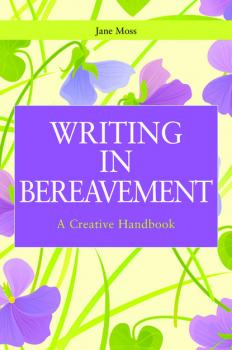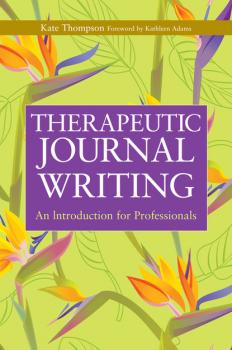Writing for Therapy or Personal Development
Скачать книги из серии Writing for Therapy or Personal DevelopmentThe Writer's Key
The Writer's Key is a complete beginner's guide to writing for self-reflection and personal development. Creative writing can deepen our understanding of ourselves and our lives. This book unlocks the potential for gaining these insights, widening perspectives, finding new positivity, increasing confidence and reducing stress through writing. It:– introduces creative writing as a very enjoyable process for enabling reflective personal and professional development – provides strategies and inspiration for getting started, continuing despite hesitations and getting the most out of writing- features uplifting accounts of individuals' successful use of the Key for self-exploration and development through creative writing. The Writer's Key assumes no prior writing experience and will inspire and encourage anyone who wants to tell and explore their story, whether they feel trapped by issues at work or home because of loss, trauma or relationships, or simply want to make more of life.
Writing in Bereavement
Writing in Bereavement is a practical creative handbook that will assist counsellors, volunteers and others in their work with bereaved adults. Writing is a powerful outlet for the emotions that accompany grief and it is therefore a valuable therapeutic tool to help those who are bereaved communicate their experiences and adjust to life after their loss. Jane Moss provides imaginative creative writing exercises for groups and individuals, using a variety of genres and literary forms and techniques. She offers advice on how to plan and run successful workshops with the bereaved, and how to evaluate their effectiveness. Using the techniques in this book, counsellors can help grieving individuals find a voice to cope with profound changes in their life, complete unfinished conversations, write for remembrance, use creativity as a respite from sadness, and finally begin to move forward from grief and imagine the future.
Poetry and Story Therapy
Poetry and short stories can act as powerful springboards to growth, self-enhancement and healing. With the guidance of a skilled facilitator, participants can engage with their own creative expression, and with that of others, and in doing so find opportunities to voice their truth, affirm their strengths, and find new ways of coping with challenges. This book explores the therapeutic possibilities of poetry and stories in turn, describing how to select appropriate works for discussion, and providing techniques for facilitating personally-relevent and growth-enhancing sessions. The author provides ideas and suggestions for personal writing activities that emerge from or intertwine with this discussion, and explains how participants can create their own poetic and narrative pieces using non-literary stimuli, such as music, photographs, paintings, objects, and physical movement. A useful appendix contains titles of individual poems, stories, and literary anthologies that the author has found particularly beneficial in her work, as well as useful further resources and contact details for readers who would like to train to be registered or certified poetry therapists or facilitators. Combining theory with innovative ideas for practical, experiential exercises, this book is a valuable tool for creative arts therapy students and practitioners, mental health and medical professionals, and anyone else interested in the healing possibilities of creative expression.
Writing Routes
The use of creative writing as a route to personal or professional development is a powerful therapeutic tool, yet often the most difficult part is knowing how and where to begin. The experiences of others, and the strategies and approaches they have used in their own writing, can provide tried-and-tested models for practice, and 'ways in' that facilitators might wish to recommend to others. Writing Routes is an essential roadmap for anybody setting out on the journey of self-discovery through words. This diverse collection of short pieces introduce and demonstrate many different ways of getting into and thinking about creative writing for personal or professional development. Seventy contributors from a variety of different backgrounds and circumstances explain how they came to write a particular piece and why, how they found ways of transforming their experience into writing, and how it was beneficial to them. Their writing ranges widely, from journal entries and stream of consciousness to autobiography, poetry, fiction and drama, and the pieces are organised by theme and genre for ease of navigation, designed to be 'dipped into' as and when they are needed. This rich and varied collection will provide writing practitioners, counsellors and other related professionals with ideas and techniques to share with their clients, and is a useful resource that individuals who write for their own personal and professional development will return to again and again.
Therapeutic Journal Writing
Writing a journal is not just about keeping a record of daily events – journal writing provides a unique therapeutic opportunity for facilitating healing and growth. The author of this book guides the reader through developing journal writing to use as a therapeutic tool. Keeping a journal can help the writer to develop a better understanding of themselves, their relationships and the world around them, as well as improve skills of problem-solving, decision-making and planning. As such, journal writing can be a powerful complement to verbal therapy, offering an effective and affordable way of extending support to troubled clients. The book includes advice on working with individuals, facilitating a therapeutic writing group, proposed clinical applications, practical techniques, useful journal prompts, exercises and case vignettes. This clear guide to the basics of journaling and its development as a therapeutic medium will be a valuable handbook for therapists, health and social care practitioners, teachers, life coaches, writing facilitators and any professional seeking personal development in themselves or their clients.
Writing Works
The use of creative writing as a route to personal development is a powerful therapeutic tool – a fact that is recognized in the growing numbers of workshops and writing groups within professional contexts, including clinical, health and criminal justice settings. Writing Works is a guide for writers or therapists working with groups or individuals and is full of practical advice on everything from the equipment needed to run a session to ideas for themes, all backed up by the theory that underpins the methods explained. Experienced practitioners in the field contribute detailed illuminating accounts of organizing writing workshops for a wide range of different clients, together with examples of their outcomes. This book will be an invaluable start-up reference for arts therapists and professionals working across the health, social care and caring professions, and one that will be referred to again and again.
Write Yourself
Write Yourself is the ideal introduction to how to facilitate groups and individuals in finding inspiration for their creative personal writing voices. This book explains how and why writing is such an illuminative, healing, and cathartic process, and provides many practical exercises that encourage the exploration of emotions, memories and experiences. Chapters cover the use of writing with a variety of client groups, including those made up of people suffering from depression, anxiety or health problems, and advice is given both on running and participating in successful writing groups. This book will be an invaluable resource for professionals working across the health, social care and caring professions, arts therapists and for everyone interested in the therapeutic qualities of creative writing.







